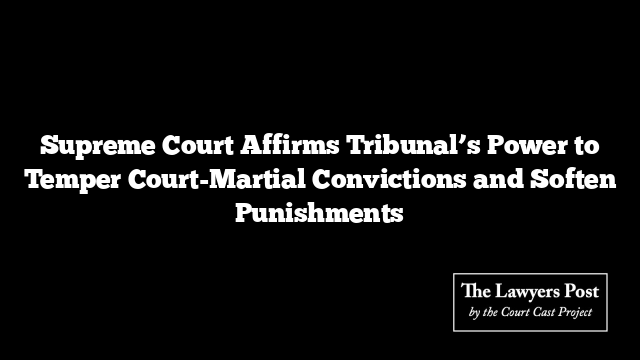The Supreme Court has clarified that the Armed Forces Tribunal (AFT) holds the authority to revisit and revise the findings of a Court Martial if those findings are found to be unjust, excessive, or contrary to law.
A bench comprising Justices J.B. Pardiwala and Alok Aradhe ruled that under Section 15(6)(a) and (b) of the Armed Forces Tribunal Act, 2007, the AFT can substitute Court Martial findings and recalibrate the punishment where warranted. The Court emphasized that this statutory power ensures both discipline and fairness within the armed services.
The case in question involved a Commandant at a vehicle depot who was accused in 2008 of corruption, unlawful possession of ammunition, and unexplained cash holdings. A General Court Martial in 2009 convicted him of corruption and possession charges, leading to his dismissal from service.
When the matter reached the AFT in 2012, the Tribunal found the corruption charge unproven and the Arms Act conviction untenable. However, it determined that his conduct was “prejudicial to good order and military discipline” under Section 63 of the Army Act. Accordingly, the AFT modified the punishment to compulsory retirement, enabling him to retain pension benefits.
The appellant later challenged the AFT’s decision before the Supreme Court, contending that the Tribunal had exceeded its authority by substituting the original findings. The Court, however, disagreed. Drawing parallels with Section 222 of the Code of Criminal Procedure—which allows conviction for a lesser or related offence—the bench held that the AFT’s powers are aligned with similar principles found in earlier military legislation.
The Supreme Court further observed that the Tribunal’s discretion was exercised judiciously, balancing the rigors of military discipline with the imperatives of fairness. “The AFT acted within the statutory framework and proportionately mitigated the punishment without undermining the disciplinary ethos,” the bench noted.
Reaffirming the Tribunal’s competence, the Court stated that Section 15(6) of the Act contains a non-obstante clause that authorizes the substitution of findings and imposition of a fresh sentence where justified. It concluded that the AFT’s leniency—converting dismissal to compulsory retirement—was lawful and proportionate.
Finding no reason to interfere, the Supreme Court dismissed the appeal, closing the long-drawn dispute.





